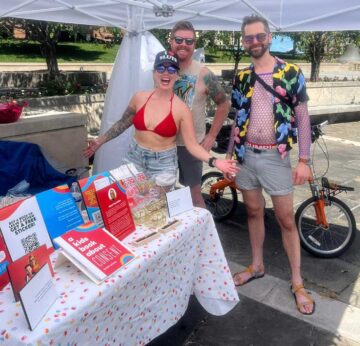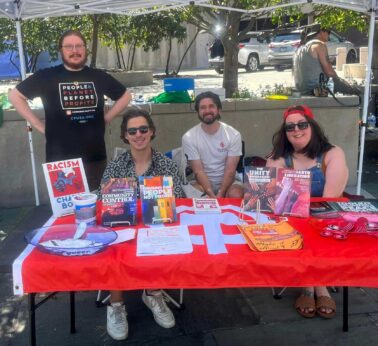
Peoria, Ill.—A powerful gathering of sexual assault survivors, current and former sex workers, strippers, harm reduction workers, and drag performers gathered here June 23 for the annual SlutWalk. The original Slut Walk occurred in Toronto, Canada, in 2011 after a police officer suggested that “women should avoid dressing like sluts” if they want to avoid sexual assault.

“It is rally-slash-protest to advocate for victims of sexual abuse and rape,” says activist Destiney Ulrich. The action is focused on “ending the stigma of what being a slut is,” Ulrich says, “because it perpetuates rape culture.” It’s also about “reclaiming the word slut.”
This year’s edition focused on challenging the shame and stigma associated with sex and sex work and educating the public about consent and sex positivity. Upon arriving, attendees encountered a sobering display of bloodied T-shirts representing missing and murdered women in Peoria.
“There’s 39 as of the current date. Some of them we don’t know where they are and most of them will never have justice” says KShe Bernard, Director of Outreach at Jolt Harm Reduction. The organization’s harm reduction street outreach provides direct care and support to unsheltered Peorians and sex workers.
“There is a girl who was a teenager, 18 when I met her,” Bernard shared. “She was trafficked and taken by a man who promised her more money. When she didn’t do what he wanted her to do, he beat her to death, put her in a suitcase, and dumped her in the woods.”
A moment of silence was followed by a series of speeches by Peoria organizers and activists. Speakers focused on education as a means to reduce both stigma and the number of assaults.
Consent education is the central aim
“We aim for participants and the public to gain a deeper understanding of the true causes of sexual violence: It’s not influenced by what a woman or any person wears, how many consensual sexual partners they have, or their occupation as a sex worker,” declared Karlie Johnson, sex educator and author of A Kids Book About Consent: Kids Are Ready.

“Sexual violence stems from perpetrators seeking power and control by forcefully taking away power and autonomy from their victims through sexual acts,” Karli told the crowd. “Consent is a freely given ‘yes,’ with no force. Consent is saying ‘yes’ because you WANT to say yes!”
Informing attendees about Erin’s Law was a highlight of the rally. Currently passed in 38 states, Erin’s Law mandates that children receive age-appropriate education to recognize sexual abuse and encouragement to tell a trusted adult if they think they are a victim. Prevention and keeping children safe is the focus.
According to erinslaw.org, 90% of child sexual abuse victims are abused by someone they know. Ulrich thinks educating children about consent is critical so that they can recognize abuse and get help to prevent harm and hold abusers accountable. “A lot of times children are not able to get help because they don’t even know that something is happening to them that’s not okay or they don’t know how to ask for help.”
Bernard concurred, “I think it is absolutely imperative if we want to raise responsible adults not broken adults. We have to have these laws. I am horrified that all states haven’t enacted it.”
Erin’s Law has yet to be passed in Republican-governed states like Idaho and Florida, and everywhere there is still sometimes pushback from parents about children’s education around the issue of consent. This is usually due to anxieties that parents have about what their children are being taught in school about sex.
Johnson emphasizes that there is a difference between sex education and consent education. “Our goal is to first teach the skill of asking, denying, and accepting consent in all activities, not just intimacy (Example: Can I have a french fry? Can I borrow your pen? Can I have a hug? Can I pet your dog?). As children mature, we progressively introduce age-appropriate discussions on consent in romantic intimacy (for example, asking “Can I kiss you?”). Given their early exposure to sexual content in media, consent educators, including myself, aim to reach them proactively, before their perceptions of what is acceptable are shaped by depictions in pornography, movies, TV shows, music, and other sources.”
Solidarity among the stigmatized
A strong presence was felt at the rally from local strippers and their legal defense fund and advocacy group, the Red Umbrella. Several spoke about the double bind of trying to survive financially while simultaneously facing intense stigma, the challenge of existing at the intersection of economic necessity, and negative public attitudes toward their profession.
“I lost my mom about a year and a half ago. [The nurses who were caring for her] were just like, ‘Where are you from? What do you do?’ and I just thought back to every house I tried to rent, every car I tried to buy, everything I’ve ever applied for,” Peoria-based stripper Charlie confided in the crowd in a moving speech. “Everybody gets weird when you say that you’re a dancer, and I just thought, ‘I can’t tell them what I really do because what if they think I am trash and won’t take care of my mom.’”
The personal impacts in everyday life are compounded by the slut-shaming that’s prevalent in the clubs.
“Strippers are seen as women who agree to be assaulted rather than as workers providing a service. Customers come in with that mindset and assume the harm they do doesn’t count,” Charlie said.
The Red Umbrella group operates a legal assistance fund and raised money through a silent auction organized around the SlutWalk, which remained open over the following week. The money raised will go to provide lawyers to strippers or sex workers who are assaulted by customers and work together to keep each other safe as fellow workers.
“I hate that my friends are more likely to be hurt because of what they do to feed their families,” Charlie said. “I hate that if they ended up in that position, they’d have to spend money that was supposed to go to their families to seek justice.”
Sex work is a stigmatized industry and is treated as a vice by most legal authorities, but advocates push back on the morality narrative and instead present the issue as a matter of worker safety on the job. “Sex workers have my heart, and my mom was a street worker. I was literally raised by sex workers,” Bernard told attendees.
“There are different degrees; there are different specialties in each [profession]. Just like engineering is a field, but there are so many different kinds of engineers,” says Charlie. “If you identify as a sex worker, then you are a sex worker.”
She explained how the job can be physically, mentally, and emotionally taxing. “The work is so mentally challenging that you are probably only able to do it for three nights a week. That is a full-time gig. Otherwise, you’re jumping off a bridge or drinking your problems away.”

Sex work is typically not a very lucrative business. Despite some media portrayals of the glitz and glam of stripper life, most strippers do not earn much for their work. “You have to pay in your own taxes and Social Security,” says Charlie. Then there’s the stigma, the discrimination by landlords, and the hurdles that come by being only paid in cash. “A lot of places won’t rent to us, so we end up in the worst places while paying more; it is the same reason why all poor people stay poor,” says Charlie.
The industry was also hit especially hard by the pandemic, not unlike restaurant and other entertainment work. “COVID came to town, all the restrictions on dancers, my job got sent to the moon.” The lockdowns caused many strippers and other sex workers to turn to online platforms and digital content creation in order to generate income.
Charlie and Destiney both stressed the importance of solidarity in the sex work industry. While traditionally there has been a hierarchical tendency ranking different types of sex work, they push back on this idea.
“Typically, in the industry, blame for assault has been passed on to the other dancers who allow” clients to do things others will not. Charlie rejects that mindset. “We can’t blame other women for the things that men do. If a man is assuming that I am comfortable with you touching me because she was, I am mad at him and not her.” No matter the type of sex worker, consent is an important part of the job, she says, and each worker must be able to set boundaries with their clients.
Destiney stresses that in the adult films she creates, “You have to be really well versed in consent when you do that because you want to make sure that if you are filming you have clear and concise consent to film, to share the film, and to make money off of it.”
Speakers also rejected the myth that sex workers cannot be assaulted and called for better treatment of sex workers by the Peoria Police. Bernard noted that the stigma of the profession makes it difficult for sex workers to seek justice when they face assaults. “I have had several people who have been sexually assaulted, and the police did not take them seriously,” she said.
Workers often face dehumanization, and they fear those who are supposed to be there to help them. This is unsurprising, given that when Peoria Police were called for assistance by unsheltered people or sex workers in the past, they “would document NHI, No Human Involvement.” They literally referred to people who were victims of crime as not human in their internal reports.
The police department claims it ended the practice, but Bernard worries the attitudes motivating this type of substandard treatment persist. “We want our folks treated with the same respect that they give anybody else. They deserve justice. The police forget they are here to protect and serve their whole community.”
A festival of the oppressed

The rally was even larger than in past years, and despite the sensitive perception that prevails when it comes to the subject matter, the event was a joyous one. Multiple organizations participated, including Imago Dei Church, The Perfectly Flawed Foundation, Central Illinois Friends, Peoria Proud, Positive Health Solutions, Vix Fit, the Peoria Club of the Communist Party USA, and the host, JOLT Harm Reduction.
Attendees were encouraged to wear what they liked, whether that was a little bit of leather, a bikini, shorts, chaps, or everyday comfort clothes like jeans and a T-shirt. Following the speeches was a drag show focused on themes of consent and sex positivity. Drag queens and kings performed songs like Meghan Trainor’s “No” and Dixon Dallas’s “Good Lookin.”
Performer Mandi Tory Consent set expectations about audience behavior. Each participant was given the option of receiving green or red beads to signal whether or not they were okay with being touched as a part of the performance. The whole of the Peoria courthouse grounds became a stage for a celebration of consent.










